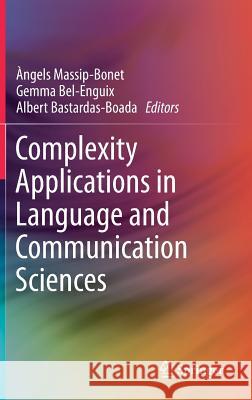Complexity Applications in Language and Communication Sciences » książka
topmenu
Complexity Applications in Language and Communication Sciences
ISBN-13: 9783030045968 / Angielski / Twarda / 2019 / 331 str.
Kategorie:
Kategorie BISAC:
Wydawca:
Springer
Język:
Angielski
ISBN-13:
9783030045968
Rok wydania:
2019
Wydanie:
2019
Ilość stron:
331
Waga:
0.66 kg
Wymiary:
23.39 x 15.6 x 2.06
Oprawa:
Twarda
Wolumenów:
01
Dodatkowe informacje:
Wydanie ilustrowane











